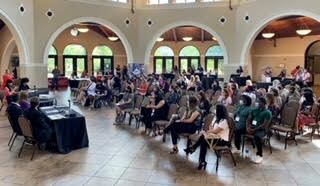The Home Front, written by Kerry Irvin, a military spouse, certified resilience trainer, and national nonprofit director shines a spotlight on the challenges and triumphs of military family life while providing useful insight, resources, and tools to help military family members thrive. To ask a question or suggest a topic for future columns, email Kerry at homefront@militarytimes.com.
Some 2,000 U.S. troops are heading to Europe on short notice, once again adding challenges to military families, and validity to the refrain, “the military family is the backbone of our nation’s armed forces.”
This refrain is echoed time and again by military leaders, politicians, and organizations across the nation. The counterpoint to this acknowledgment of the role families play in bolstering military stability is the fact that when this central support system is weakened, military readiness and retention suffer.
Challenges are nothing new to military families, nor are the struggles military spouses encounter when seeking fulfilling work, career growth, and economic stability. For decades military spouses who want to work have had to contend with frequent PCS moves, deployments, or minimal employment opportunities near their assigned installation. These factors have interfered with their ability to obtain or sustain employment, and introduce additional family stressors that can contribute significantly to a service member’s inability to stay mission ready, and in some instances may lead to a decision to leave the military.

A recent report conducted by Hiring Our Heroes and Burning Glass Technologies found 39% of military spouse respondents discussed wanting their service member to leave active-duty military service because of obstacles they encountered in regard to their own employment opportunities. While impediments to employment are not singular to the military spouse community, this is a segment of the population that is disproportionately affected.
Unlike veteran hiring information, data on military spouse employment is obtained and shared infrequently by government agencies. There have been varying numbers about the unemployment rate of military spouses, and different groups use different methodologies. Some advocates are pushing for the tracking of military spouse unemployment, similar to the Department of Labor’s Bureau of Labor Statistics’ tracking of unemployment data for veterans. That data has made a difference in awareness and action for veterans.
Prior to the Covid-19 pandemic, the U.S. Department of Labor estimated the civilian unemployment rate to be less than 5%, while the military spouse unemployment rate was reported at five to six times that and expected to climb to 30% or more in the wake of the pandemic, according to data released by Blue Star Families in their Pain Points Poll Deep Dive report.
These statistics are staggering, but hope on the horizon on several fronts. Discussions surrounding military spouse under- and unemployment have become much more widespread, with dialogue expanding well beyond the Defense Department’s Spouses Survey and into the business sector, every level of government, academia, and nonprofit organizations. Changemakers representing these interests are tuning into the needs that have been vocalized by military spouses and are working together to help forge creative solutions to break down longstanding barriers. Employers who formerly eschewed military spouses for the gaps in their resumes or frequent job changes are beginning to understand that this highly diverse workforce is uniquely suited for today’s environment, which requires employees to be adaptable, resourceful, and independent – all qualities that military spouses develop through their complex lifestyles.
In an effort to support the hiring of more military spouses in the federal workforce, The Office of Personnel Management announced new hiring policies which gave federal agencies greater flexibility in hiring military spouses through the broadening of the Priority Placement Program, and in a nod to remote work, allowed for the removal of some geographic restrictions. Through Military OneSource, DoD has a catalog of programs offering military spouses no-cost assistance with continuing education, career exploration, employment readiness, licensing assistance, and free career coaching.
Military-serving nonprofit organizations have long sought to understand the ramifications of spouse employment barriers on military families, as well as the economic impact to our nation. Through its Milspouse Employment Study, Blue Star Families found that the unemployment, underemployment, and reduced labor force participation among military spouses cost the U.S. economy approximately $1 billion per year.
Through Hiring Our Heroes, the U.S. Chamber of Commerce Foundation offers military spouses free opportunities to participate in fellowship programs, build professional networks, participate in hiring events, and explore self-employment and entrepreneurship avenues. In order to ensure the portability of their career, many military spouses have opted to create their own businesses. According to the Military Spouse Chamber of Commerce, nearly half of all military spouses are business owners, entrepreneurs, or aspire to be. The chamber offers these spouses free membership into its association and access to tools and resources specifically designed to help military spouses navigate business ownership within the military lifestyle.

Even before the onset of the pandemic, savvy businesses understood the benefits of providing opportunities for military spouses to join their teams through transportable remote work opportunities. Job boards such as VirtForce teamed with business owners to offer virtual work geared specifically for the military community. Individual businesses, such as Freedom Learning Group embrace a virtual workforce and create remote employment opportunities benefitting military spouses.
Other businesses support military spouses through providing corporate volunteers to aid with professional development and mentorship. In their 2019-2020 Military Spouse Entrepreneur Survey, The Rosie Network found that 94% of military spouse entrepreneurs felt having a mentor would be helpful. Founded to serve transitioning veterans, American Corporate Partners recently opened up their mentorship program to include military spouses, pairing spouses with Fortune 500 business professionals and established entrepreneurs to assist in career exploration, resume review, interview preparation, coaching, and networking.
In addition to resources specifically for employment assistance, steps are being taken to help with other challenges that impact employment opportunities. For example, childcare costs can often be prohibitive for military families and may limit employment opportunities for spouses. In a move designed to help defray those costs, the Department of Defense announced last June a new pilot program to grant fee assistance to military families for full-time, in-home childcare providers.
While new initiatives like the DoD’s childcare program are welcome improvements, there is still much that can be done to improve military spouse employment options. As our nation’s service members are once again called upon to deploy with little notice for an unspecified amount of time, the need for military spouses to have supportive resources and flexible work is amplified. By developing measures to aid military spouse employment, the Department of Defense bolsters the readiness of its fighting force. By hiring military spouses, businesses have the opportunity to not only support the military, but to also add diverse, capable, and adaptable members to their teams. By continuing the conversation, we can all help support military spouses and their families.
Kerry Irvin is an active-duty military spouse and DoD-certified resilience trainer, her efforts to create communities in which military families can thrive have been recognized with the President’s Lifetime Achievement Award and the Secretary of the Army’s Superior Public Service Medal.





